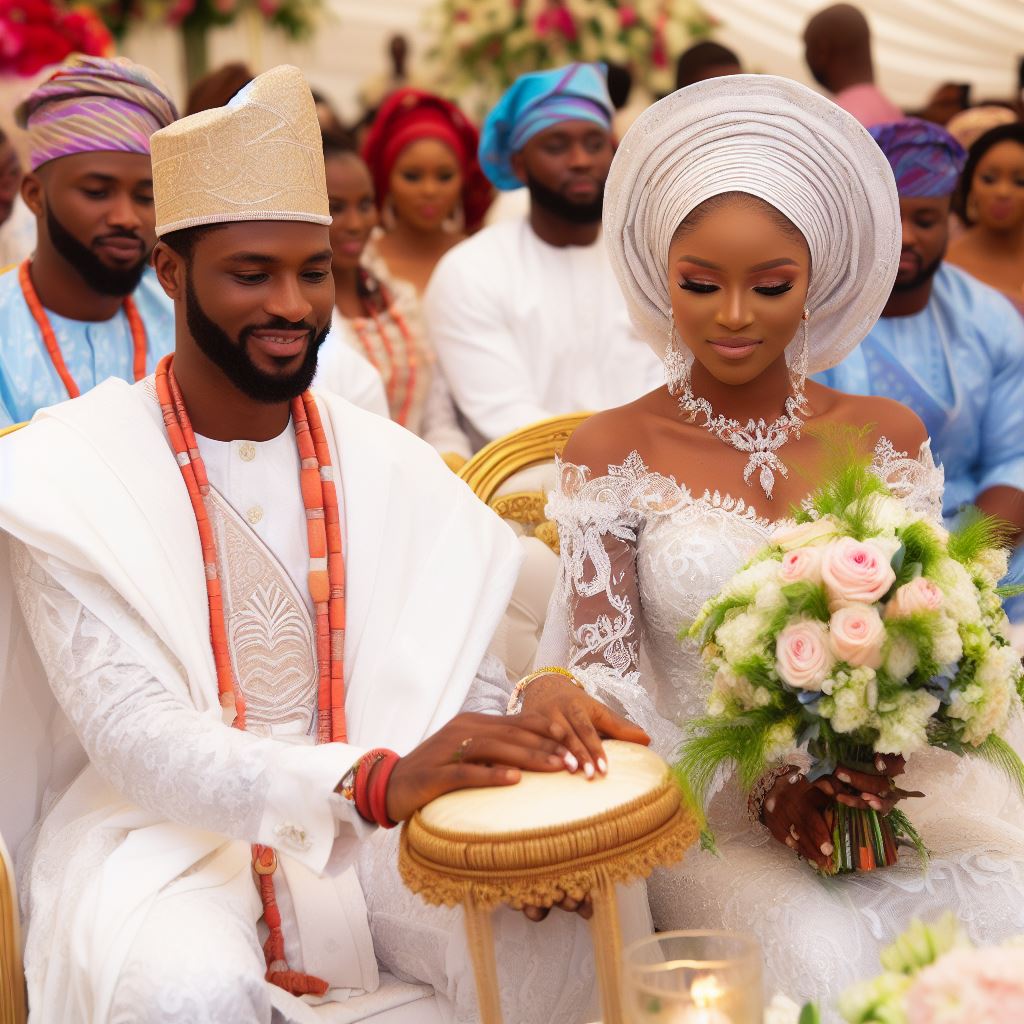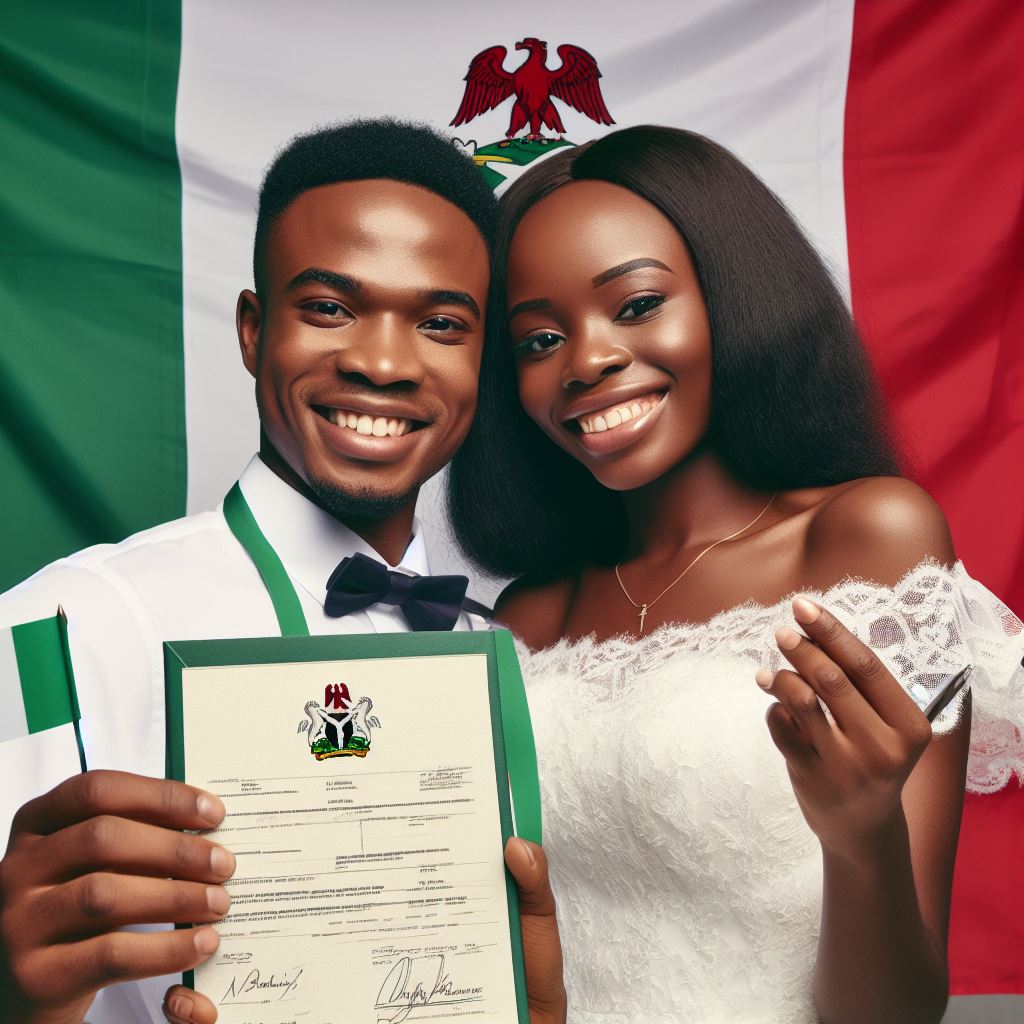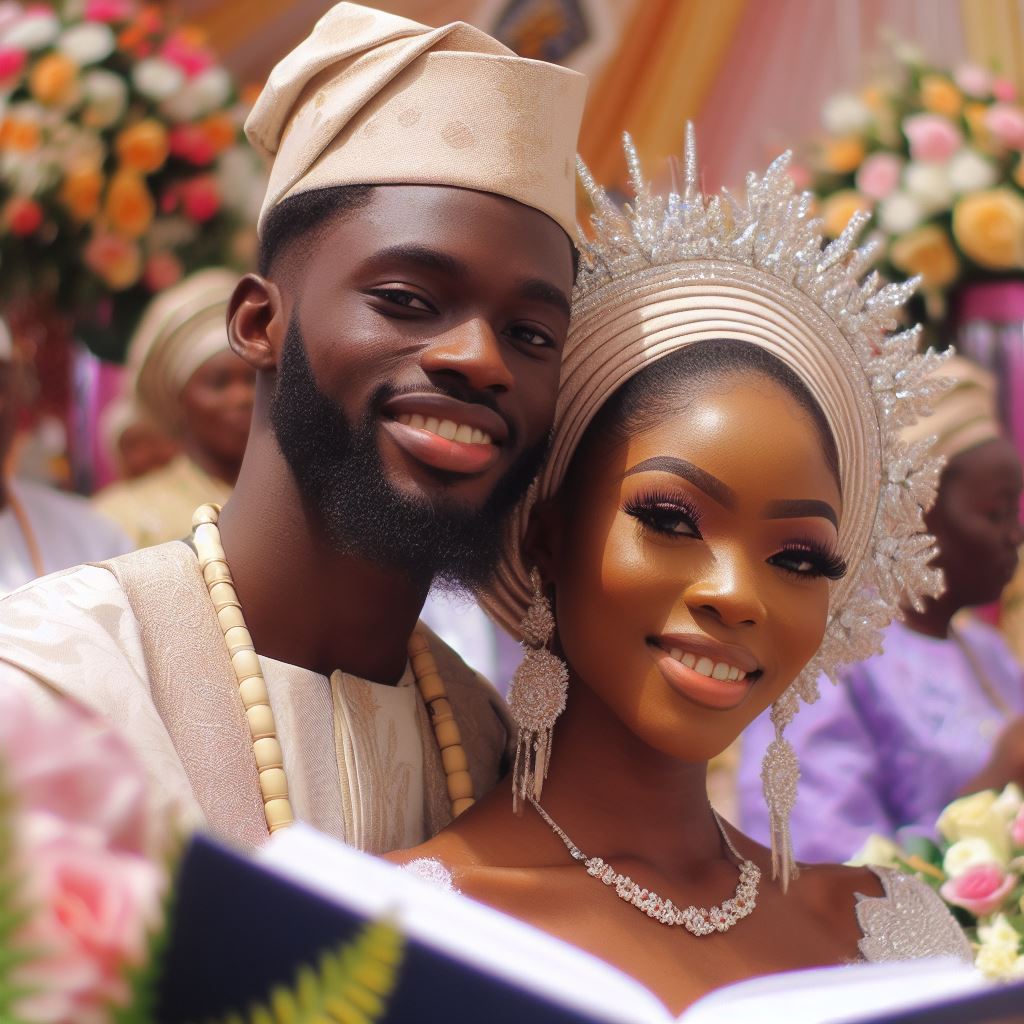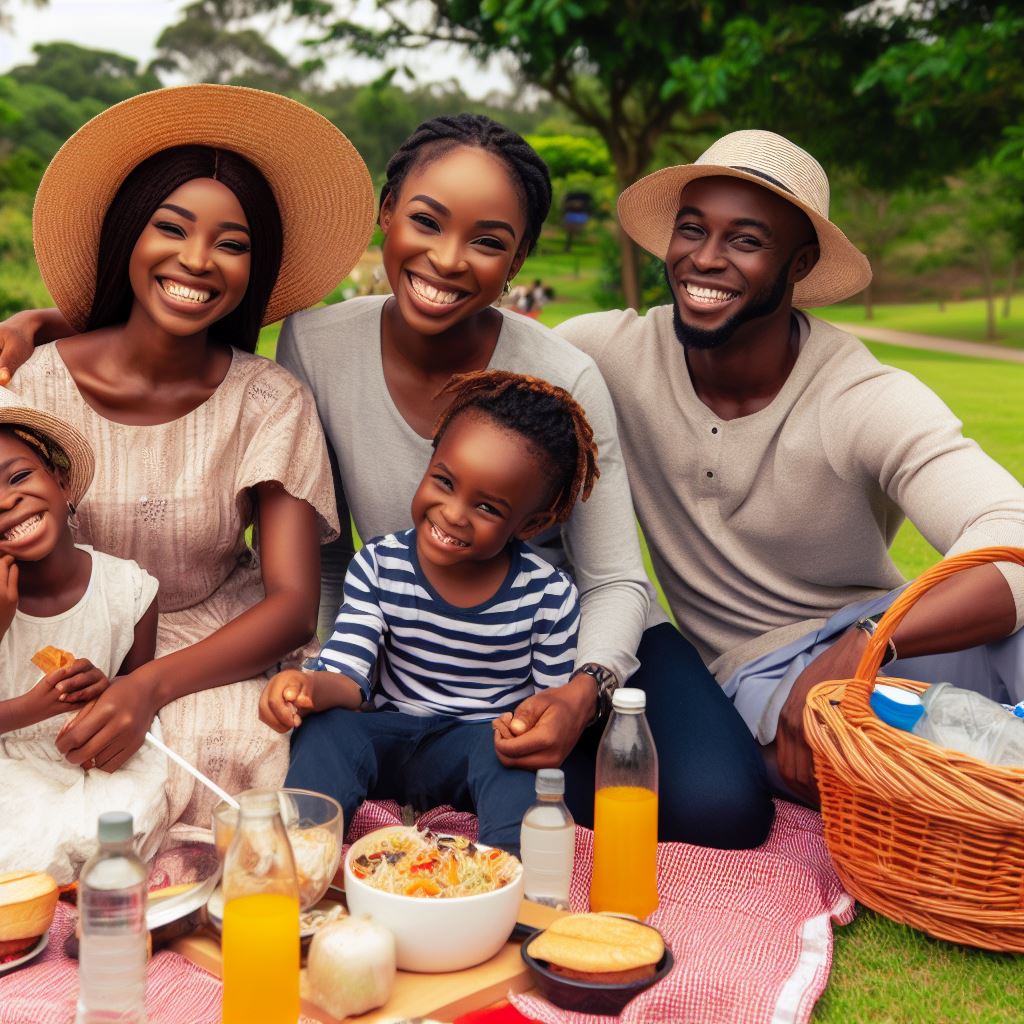Introduction
Definition of intercultural marriages
Intercultural marriages refer to unions between individuals from different cultural backgrounds.
In Nigeria, it is essential for couples to understand the certificates and customs involved in their marriage. This understanding is crucial for the success and harmony of the intercultural relationship.
Importance of understanding certificate and customs in Nigeria
Understanding certificates and customs in Nigeria is crucial for successful intercultural marriages.
- Certificates play a significant role in intercultural marriages in Nigeria. They are legal documents that validate the union and provide proof of marriage.
- Couples must familiarize themselves with the required certificates, such as the marriage registration form, affidavit of freedom to marry, and birth certificates.
- Moreover, understanding customs is vital in navigating intercultural marriages in Nigeria. Different ethnic groups in Nigeria have diverse customs and traditions associated with marriage ceremonies.
- From the Yoruba to the Igbo and Hausa cultures, each has its unique customs, including engagement rites, dowry negotiations, and wedding ceremonies.
- Respecting and incorporating these customs into the marriage ceremony fosters cultural integrity and strengthens the bond between the couple and their families.
- Awareness and respect for Nigerian customs not only ensure a successful marriage but also promote cultural appreciation and tolerance.
- By embracing each other’s cultural backgrounds, intercultural couples can forge a stronger foundation for their relationship.
- This understanding can also help avoid misunderstandings and conflicts that may arise due to cultural differences.
Basically, intercultural marriages require an understanding of certificates and customs in Nigeria.
By acknowledging and respecting these vital aspects, couples can navigate their unions successfully, embrace diversity, and nurture a harmonious and fulfilling relationship.
Overview of marriage certificates in Nigeria
Legal requirements for obtaining a marriage certificate
- Both partners must meet the minimum age requirement set by Nigerian law.
- Consent from both partners, as well as from the parents or guardians if one or both parties are underage.
- The marriage must be registered with the appropriate government registrar.
Importance and benefits of having a valid marriage certificate
A valid marriage certificate serves as proof of legal marriage, which is essential for various reasons.
- It provides legal recognition and protection for the married couple and their rights.
- It simplifies the process of obtaining spousal visas for international travel or immigration purposes.
- It allows couples to access social and financial benefits, such as health insurance, joint bank accounts, and property ownership.
- It provides legal documentation for child custody and inheritance rights.
Challenges faced in obtaining marriage certificates for intercultural couples
Intercultural couples often face additional challenges when obtaining marriage certificates in Nigeria.
- Cultural differences and language barriers can complicate the registration process.
- Some families may object to intercultural marriages, leading to social pressure and resistance.
- Lack of awareness about the necessary documentation and processes can cause delays and difficulties.
- Additional requirements, such as religious ceremonies or traditional customs, may need to be fulfilled.
Overall, obtaining a marriage certificate in Nigeria requires meeting legal requirements, understanding the importance and benefits of having a valid certificate, and overcoming challenges faced by intercultural couples.
Read: Preparing for Your First Marriage Counseling Session in Nigeria
Traditional customs in Nigerian intercultural marriages
Overview of diverse Nigerian cultures and traditions
- Nigeria is a country with over 250 distinct ethnic groups, each with its own unique customs and traditions.
- These ethnic groups include the Igbo, Yoruba, Hausa, Fulani, Ijaw, Kanuri, and many others.
- Each group has its own language, beliefs, values, and practices, making Nigeria a culturally diverse nation.
Role of Traditional Marriage Ceremonies
- In Nigerian intercultural marriages, traditional marriage ceremonies play a significant role.
- These ceremonies serve as a way to honor and celebrate the union of two individuals from different cultures.
- They showcase the rich cultural heritage of both the bride and groom’s families.
1. Bridal price or dowry customs
- In many Nigerian cultures, the groom is required to pay a bride price or dowry to the bride’s family.
- This serves as a symbol of appreciation and respect for the bride’s family and their support of the union.
- The bride price may include gifts, money, livestock, or other valuable items.
2. Traditional marriage rites and rituals
- Traditional marriage rites and rituals vary across Nigerian ethnic groups.
- These rites often involve pre-wedding ceremonies, such as the introduction ceremony, engagement ceremony, and traditional blessings.
- During the wedding ceremony, cultural practices like the exchange of gifts, pouring of libations, and traditional dances are performed.
3. Ceremonial attire and cultural symbolism
- One of the most visually striking elements of Nigerian traditional marriage ceremonies is the ceremonial attire.
- Brides and grooms dress in traditional outfits that reflect their cultural heritage.
- These outfits are often adorned with intricate patterns, beads, and embroidery, symbolizing different aspects of their culture.
Importance of respecting and embracing each other’s cultural customs
- In intercultural marriages, it is crucial for partners to respect and embrace each other’s cultural customs.
- By understanding and valuing their spouse’s culture, they foster mutual understanding and strengthen their relationship.
- Respecting and participating in cultural customs can also help bridge the gap between families and create a sense of unity.
In summary, Nigerian intercultural marriages are a beautiful blend of diverse cultures and traditions. Understanding the rich tapestry of Nigerian customs is vital for a successful intercultural marriage.
Through embracing each other’s cultural customs, couples can create a harmonious and inclusive union that celebrates their unique backgrounds.
Read: Marriage in Nigeria: The Legal Vs. Traditional Perspective
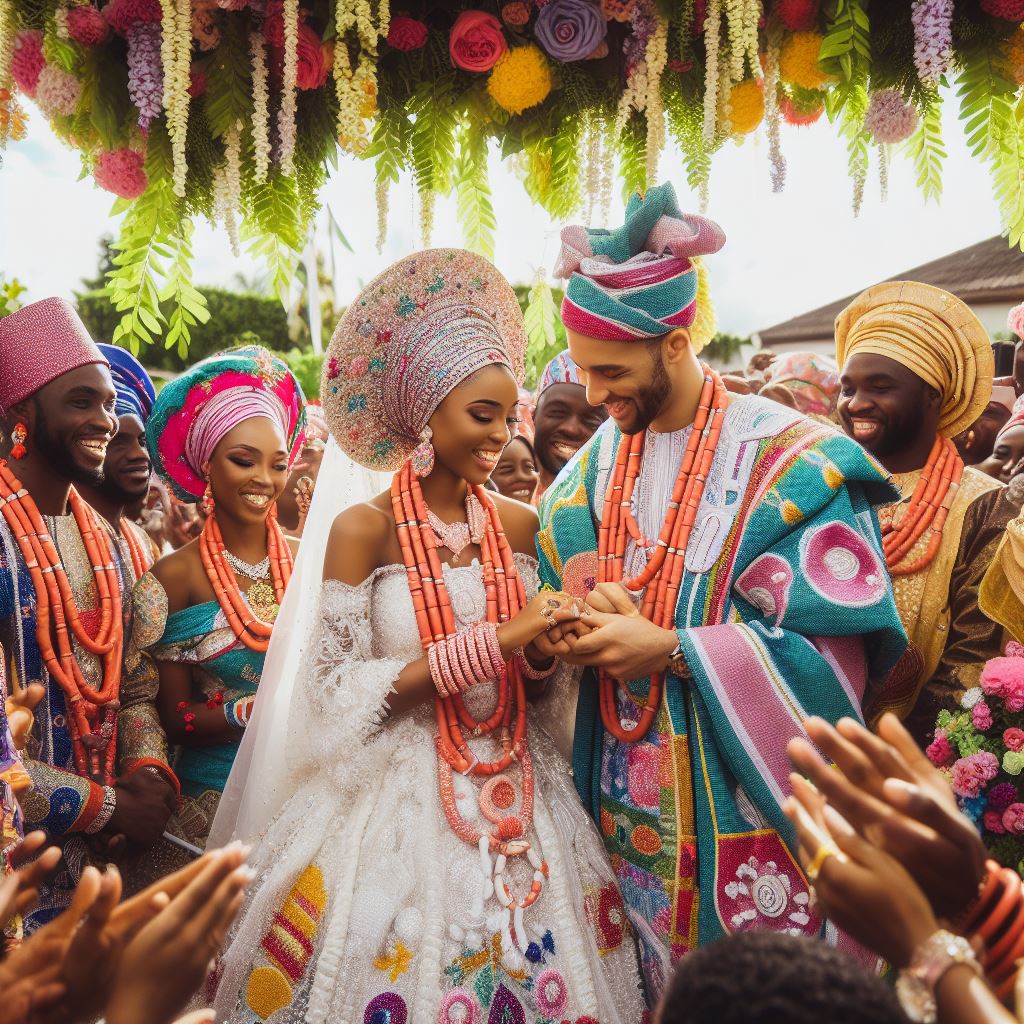
Legal implications and considerations for intercultural marriages
Dual marriage ceremonies: traditional and civil
- Necessity of complying with legal requirements: Intercultural couples must ensure they meet all legal requirements for their marriage to be recognized.
- Differences in legal recognition between traditional and civil ceremonies: Traditional marriage ceremonies may not hold legal weight, so couples often have to perform a civil ceremony as well.
Challenges faced by intercultural couples in navigating legal procedures
- Documentation requirements: Couples must gather and provide all necessary documentation to prove their identity and eligibility for marriage.
- Marriage registration process for foreigners: Foreigners marrying Nigerians may encounter additional steps and requirements when registering their marriage.
Advantages of proper legal documentation for intercultural marriages
Having the proper legal documentation for their intercultural marriage offers several advantages for couples:
- Legal recognition and protection: Meeting legal requirements ensures their marriage is legally recognized and protected under Nigerian law.
- Access to benefits and privileges: Having a legally recognized marriage allows couples to access various benefits and privileges, such as inheritance rights and healthcare benefits.
- Facilitation of cross-border movement: Proper documentation simplifies the process of traveling and living in different countries for intercultural couples.
- Elimination of potential legal complications: With correct documentation, couples can avoid legal issues that may arise due to lack of recognition or improper registration.
Read: The Evolution of Marriage Views among Nigerian Youth
Learn More: How Religion Shapes Marital Conflicts in Nigeria
Social acceptance and challenges for intercultural couples in Nigeria
In Nigerian society, intercultural marriages can face challenges due to social acceptance and various attitudes towards them.
Understanding these attitudes, ethnoreligious factors, and addressing societal prejudices can help promote unity in these relationships.
Attitudes towards intercultural marriages in Nigerian society
- Intercultural marriages in Nigeria are viewed differently by different individuals and communities.
- Some Nigerian societies are more open and accepting of intercultural marriages.
- However, there are traditional communities that still prefer endogamy, marrying within their own culture.
- Attitudes towards intercultural marriages can also depend on education, exposure, and urbanization levels.
- Younger generations in Nigeria are generally more open-minded towards intercultural relationships.
Ethnoreligious factors influencing social acceptance
- Religion plays a significant role in determining social acceptance of intercultural marriages in Nigeria.
- In some ethnic groups, marrying someone from a different religious background is seen as a threat to cultural identity.
- Interfaith marriages can face more challenges due to conflicts arising from religious beliefs and practices.
- Religious leaders and institutions also influence the acceptance and support of intercultural marriages.
Addressing societal prejudices and promoting unity in intercultural marriages
- Education and awareness programs can help address societal prejudices towards intercultural marriages.
- Media representation of successful intercultural couples can challenge stereotypes and promote acceptance.
- Intercultural couples can actively engage in activities that foster unity and understanding among different cultures.
- Seeking support from friends, family, and support groups can alleviate some challenges faced by these couples.
- Public campaigns promoting the benefits and enriching aspects of intercultural marriages can create a positive narrative.
In general, social acceptance of intercultural marriages in Nigeria is influenced by various attitudes and ethnoreligious factors.
While some Nigerian communities are more accepting, others still prioritize endogamy. By addressing societal prejudices, promoting unity, and increasing awareness, intercultural couples can help bridge the gap and create a more inclusive society.
Read: The Stigma of Seeking Marriage Counseling in Nigeria: Breaking Myths
Conclusion
Recap of Intercultural Marriages in Nigeria
Intercultural marriages in Nigeria have been discussed, highlighting the challenges and benefits.
Summary of certificate and customs importance
The importance of certificates and customs in intercultural marriages has been explained.
Encouragement for intercultural couples to celebrate their diversity and love
Intercultural couples are encouraged to embrace their diversity and love for each other.

